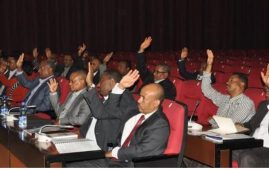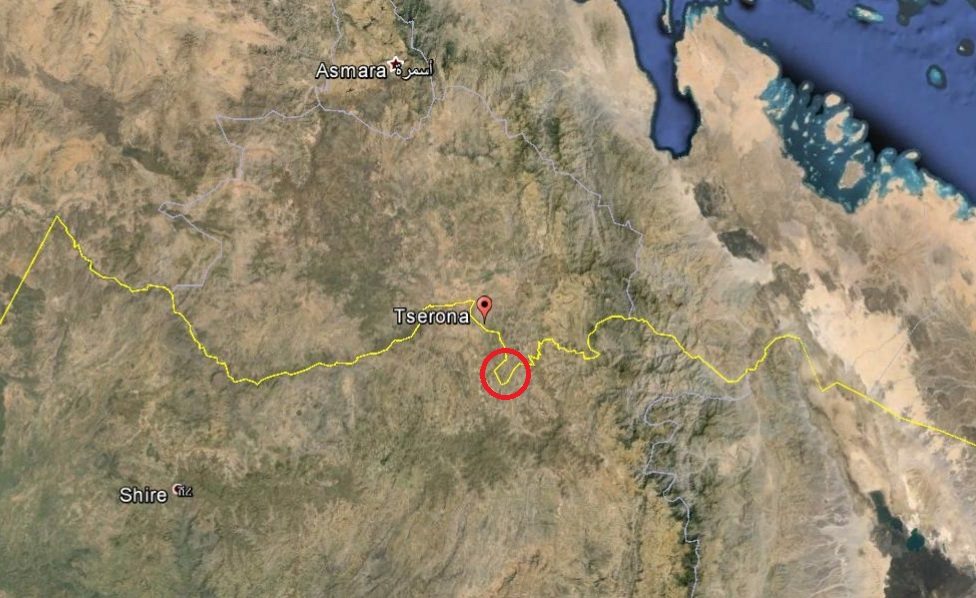[from: A Week in the Horn of Africa – Dec. 16, 2011]
Since the tightening of sanctions last week the regime in Asmara has unleashed a media campaign of its usual invective against the US for its “responsibility”. The US is alleged to be behind the sanctions and history is repeatedly called upon to explain that it has always been out to get Eritrea and the Eritreans. The regime claims that none of the so-called evidence leveled against Eritrea matters, and to the extent that Eritrea is found to be in the wrong by the United Nations Security Council, this is entirely US fabrication. In the same way, the fact that the Council voted sanctions with 13 in favor, none against, and two merely abstaining, is also dismissed. The regime simply ignores the possibility that the Security Council, and indeed the international community might be capable of judging it on the basis of the mountain of evidence now available.
Not for the first time, it appears that the regime in Asmara is obsessed with the idea that its enemies are really the great powers. It always chooses the larger possibility rather than the smaller. When its forces were routed by Ethiopia in 2000, President Isaias promptly chose to blame Eritrea’s defeat on the US and other powers rather than admit he had been out maneuvered by Ethiopian forces. Similarly, Eritrea, the regime would have us believe, is too big and important to be the subject of a sanctions draft from Gabon or Nigeria, or even IGAD.
These self-delusions are on full display in the regime’s current media campaign, coupled with the lengthening list of its enemies. The tone is becoming steadily more hysterical. One thing that is conspicuously missing, it might be noted, is even the slightest hint of any admission of responsibility. Indeed, far from this, the response has been more threatening. A recent statement from Eritrea’s foreign ministry claims that the tightening of sanctions on Eritrea will have disastrous consequences "for the people of Ethiopia". The threat of extending its campaigns against the people of Ethiopia is very clear. We must hope that the regime is not yet ready for a terminal suicide campaign. Nevertheless, its statement may not be merely an idle threat. Fortunately, however, for those on this side of the Mereb River, security depends less on any Eritrean commitment to peace than on our vigilance against its adventurism.
As we have seen, at one level the reaction to tightened sanctions is to try to shift the blame to others, coupled with a shrill claim of being the victim of a concerted campaign led by the US. Not surprisingly, the regime is very silent on why the rest of the world went along with the US in this, though condescendingly it castigates the rest of the international community as America’s “pliant instruments”.
The Russians get blamed for the explanation of how the UN Monitoring Group can claim to have found weapons sold by Russia to Eritrea in the hands of Al-Shabaab fighters. It has to be said it is a particularly bizarre explanation. A government statement admits that the serial number of some weapons found indicated that they did indeed belong to Eritrea. The regime then investigated how these guns could have fallen into the hands of Al-Shabaab. The result, according to the investigation, was that the weapons were in fact still in the government’s hands.
So how was it possible that they could be found in the hands of Al-Shabaab? Well, the answer, according to the government statement, provides further proof of just how sinister the US regime is. Apparently, the former US Secretary of State, Collin Powell, agreed some years ago with his Russian counterpart to exchange information regarding the sales of each country’s weapons to third parties. This, the statement claims, explains how copies of the end user certificates of sales between Russia and Eritrea ended up in the hands of the US government. The US government, of course, handed this information over to the UN Monitoring Group as part of its efforts to defame the Government of Eritrea. The Russians, the statement tells us, were oblivious to this arrangement when the ‘so-called evidence’ was submitted to them by the UN Monitoring Group, but it was only when the Eritreans alerted them to the arrangement that Russia had with the US that they finally decided to abstain.
It is not entirely clear if this alleged drama is meant to be taken seriously by anyone, but the fact that the statement was made in Tigrigna, not in English, suggests it was meant for domestic consumption. This leads to the second level of the regime’s reaction towards the increased sanctions. The first reaction has been indignation at the "injustice visited upon the Eritrean people". At a different level, however, the regime has been very keen to show that the sanctions are actually “toothless, watered down" and that they can easily be withstood by what the regime’s ministry of information rather curiously calls a “resolute rebuff" by Eritrean nationals. In other words, the intent is to reassure its supporters that, despite the campaign by the US and all its allies, sanctions will have no effect: certainly they will be incapable of bringing about any behavioral change by the regime.
That, of course, is the crux of the matter. Whatever the nature of the sanctions, strong or weak, just or unjust, there is no indication that the regime in Asmara is prepared to even begin to mend its ways. It appears quite determined to continue to lie, to prevaricate and keep trying to dodge the impact of whatever sanctions may be imposed. That is why implementation of the sanctions and of Resolution 2023 (2011) must be taken seriously and properly implemented.
******
Check the Eritrea archive and Eritrean terrorism archive for related posts.





